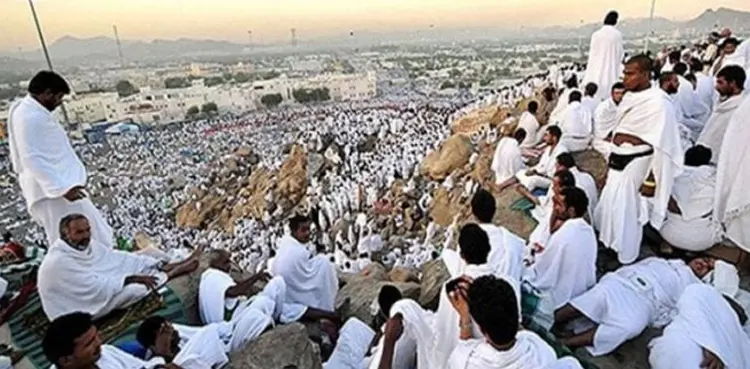
The annual Hajj pilgrimage to Makkah is a sacred obligation for millions of Muslims worldwide. To ensure the safety, security, and orderly conduct of this monumental event, the Kingdom of Saudi Arabia implements stringent regulations. In a recent and emphatic statement, the Saudi Ministry of Interior has reiterated its resolute commitment to enforcing these rules, issuing a stark warning: Hajj violators will face immediate deportation and a 10-year ban from entering the Kingdom. This decisive action underscores Saudi Arabia's dedication to preserving the sanctity of the pilgrimage and facilitating a smooth and spiritual experience for all authorized pilgrims.
Understanding the Gravity of Hajj Violations
The Hajj is one of the five pillars of Islam, a spiritual journey undertaken by millions annually. The sheer scale of this gathering necessitates meticulous planning and strict adherence to regulations. Hajj violations are not merely administrative oversights; they pose significant challenges to crowd management, strain essential resources, and can compromise the safety and well-being of legitimate pilgrims. The Saudi authorities view these violations with the utmost seriousness, recognizing their potential to disrupt the sanctity and order of the pilgrimage.
Key Types of Hajj Violations
The Saudi Ministry of Interior has clearly outlined various forms of Hajj violations that will incur severe penalties. These primarily revolve around unauthorized access and participation in the Hajj rituals.
- Performing Hajj Without a Valid Permit: This is the most significant and widely targeted violation. All individuals, whether residents of Saudi Arabia or international pilgrims, must possess a specific, official Hajj permit to participate in the pilgrimage. Attempting to perform Hajj with any other type of visa (e.g., tourist visa, Umrah visa, or visit visa) or without any permit whatsoever is strictly prohibited.
- Illegal Entry into Holy Sites: The authorities have designated specific entry points to Makkah and the Holy Sites during the Hajj season. Entering these areas without a valid Hajj permit or authorized work permit is considered a major violation. This includes attempts to bypass checkpoints or enter through unofficial routes.
- Transporting Unauthorized Pilgrims: Individuals, whether Saudi citizens or expatriates, who facilitate or transport individuals without a valid Hajj permit to the Holy Sites face exceptionally severe penalties. This includes drivers, tour operators, and anyone found to be aiding such illicit activities.
- Overstaying Visas with Intent to Perform Hajj: Some individuals enter Saudi Arabia on Umrah or visit visas before the Hajj season and then attempt to overstay their permitted duration with the intention of joining the Hajj pilgrimage illegally. This is a direct circumvention of the regulations and is met with stringent enforcement.
- Using Fake Hajj Credentials: Presenting fraudulent documents or credentials to gain access to the Hajj is a criminal offense that will result in immediate and severe repercussions.
The Imminent Consequences: Deportation and 10-Year Ban
The Saudi Ministry of Interior's warning is unequivocal: Hajj violators will face a dual penalty of immediate deportation and a 10-year ban from re-entering the Kingdom. This serves as a powerful deterrent against any attempts to circumvent the official Hajj regulations.
Deportation for Expatriate Violators
For expatriate residents caught in Hajj violations, the consequences are swift and decisive. Upon identification and processing, these individuals will be immediately deported from Saudi Arabia. This not only means the termination of their stay but also a permanent mark on their immigration record, making future entry into the Kingdom exceptionally difficult. The process of deportation is designed to be efficient, ensuring that violators do not continue to pose a burden on the Hajj infrastructure. The message is clear: compliance with Hajj regulations is non-negotiable for all residents.
The Comprehensive 10-Year Ban
Beyond deportation, a critical component of the penalty for Hajj violators is the 10-year ban on re-entry into Saudi Arabia. This means that individuals who violate Hajj regulations will be prohibited from obtaining any type of visa – be it for tourism, work, Umrah, or any other purpose – for a full decade. This extended ban is a testament to the Saudi authorities' zero-tolerance policy towards unauthorized Hajj attempts and their determination to safeguard the integrity of the pilgrimage for years to come. The 10-year ban ensures that the consequences of such violations are long-lasting and serve as a significant disincentive.
Additional Penalties for Hajj Violators
While deportation and the 10-year ban are primary consequences, Hajj violators can also face a range of other severe penalties:
- Fines: Individuals attempting to perform Hajj without a permit, or those entering prohibited areas, can face substantial monetary fines. These fines can range from SAR 10,000 to SAR 20,000 for individual violators, with repeat offenders facing even higher penalties of up to SAR 100,000. These financial penalties are designed to be a significant deterrent.
- Imprisonment: Those involved in facilitating illegal Hajj attempts, such as transporters or organizers, may face imprisonment for up to six months, in addition to hefty fines. This legal recourse targets the networks that enable unauthorized pilgrimages.
- Confiscation of Vehicles: Vehicles used in the illegal transport of unauthorized pilgrims will be subject to judicial seizure and confiscation. This measure aims to dismantle the logistical support for illicit Hajj operations.
- Public Naming: In some cases, authorities may publicly name individuals or entities involved in severe Hajj violations to further discourage such acts. This adds a layer of public accountability and shaming to the penalties.
The Rationale Behind Strict Hajj Regulations
The Kingdom of Saudi Arabia's strict enforcement of Hajj regulations is not arbitrary; it is born out of a profound responsibility to manage an event of unparalleled scale and spiritual significance. The primary objectives of these stringent measures include:
- Ensuring Pilgrim Safety and Security: With millions of pilgrims converging in a relatively confined area, crowd control and safety are paramount. Unauthorized pilgrims can lead to overcrowding, stampedes, and put immense pressure on emergency services, thus jeopardizing the safety of all. The Hajj regulations are designed to prevent such chaotic scenarios.
- Maintaining Order and Organization: The Hajj involves a series of intricate rituals performed at specific times and locations. A controlled flow of pilgrims is essential to ensure that everyone can perform their rites without hindrance. Hajj violations disrupt this order, leading to congestion and delays.
- Efficient Resource Allocation: Providing accommodation, transport, medical facilities, food, and water for millions requires immense logistical planning. Unauthorized pilgrims strain these resources, potentially depriving authorized pilgrims of essential services. The Hajj regulations help in efficient resource management.
- Preserving the Sanctity of the Hajj: The Hajj is a deeply spiritual journey. Adherence to official channels and regulations respects the sanctity of the pilgrimage and the sacred sites. Attempting to perform Hajj illegally undermines the established and divinely ordained process.
- Preventing Exploitation and Fraud: Strict regulations help combat fraudulent travel agencies and individuals who exploit unsuspecting pilgrims by promising illegal access to Hajj. The Hajj permit system ensures that pilgrims are part of legitimate and supervised groups.
The "No Hajj Without a Permit" Campaign
In recent years, the Saudi authorities have intensified their "No Hajj Without a Permit" campaign. This initiative aims to raise awareness among potential pilgrims and to deter unauthorized attempts. The campaign emphasizes that a valid Hajj permit is the only gateway to participating in the pilgrimage.
The Ministry of Interior, in collaboration with the Ministry of Hajj and Umrah, consistently disseminates this message through various channels, including:
- Public Announcements: Regular warnings and official statements are issued through state media and international news outlets.
- Digital Platforms: The Nusuk platform, the official portal for Hajj and Umrah services, plays a crucial role in facilitating legitimate applications and providing information on Hajj regulations.
- International Outreach: Saudi embassies and consulates worldwide work with local Hajj missions to educate prospective pilgrims about the mandatory requirements and penalties for Hajj violations. This often includes warnings specifically directed at countries with a history of unauthorized Hajj attempts, such as Pakistan, as highlighted in recent news.
Advanced Technologies to Combat Hajj Violations
Saudi Arabia is increasingly leveraging cutting-edge technology to enhance its surveillance and enforcement capabilities against Hajj violators. This includes:
- Drones and AI: Advanced drones equipped with high-resolution cameras and artificial intelligence are being deployed to monitor remote areas and identify suspicious movements of individuals and vehicles attempting to enter the Holy Sites without authorization. Thermal imaging helps in detecting unauthorized gatherings.
- Smart Surveillance Systems: A vast network of CCTV cameras and smart monitoring devices provides real-time footage to command centers, enabling security forces to quickly respond to potential Hajj violations.
- Biometric Systems: The integration of digital health and biometric systems into the application process further streamlines verification and helps in identifying individuals who may have been previously deported or banned due to Hajj violations.
- Digital ID Cards: Pilgrims are provided with digital ID cards that facilitate services and help in tracking their movements, ensuring they remain within authorized areas.
These technological advancements significantly bolster the Kingdom's ability to enforce Hajj regulations and maintain a secure environment for all pilgrims, thereby ensuring the sanctity of the Hajj.
Guidance for Prospective Pilgrims: Ensuring a Legitimate Hajj
For aspiring pilgrims, understanding and adhering to the official procedures is paramount to avoiding severe penalties like deportation and the 10-year ban. Here’s essential guidance:
Obtain a Hajj-Specific Visa and Permit:
- International Pilgrims: Apply for a single-entry Hajj visa exclusively through the Nusuk platform or authorized Hajj missions and travel agencies in your home country. This visa is distinct from tourist or Umrah visas and is specifically for the Hajj period.
- Saudi Citizens and Residents: Obtain a Hajj permit through the Nusuk platform or other designated official channels. Even residents require this permit to access Makkah and the Holy Sites during the Hajj season.
- Nusuk Platform: This official government platform is the primary portal for Hajj applications and services for pilgrims from serviced countries. Ensure your application is processed through this legitimate channel.
Book Through Authorized Channels:
- Always book your Hajj package (flights, accommodation, transportation) through officially approved Saudi travel agencies or through the Nusuk platform. Avoid unofficial brokers or individuals promising shortcuts, as these are often scams that lead to Hajj violations and severe consequences.
Adhere to Health and Documentation Requirements:
- Vaccinations: Ensure you have all mandatory vaccinations, particularly against Meningococcal Meningitis. Other vaccinations like yellow fever, polio, and seasonal influenza may also be required depending on your origin and health profile.
- Valid Passport: Your passport must be valid for at least six months beyond your intended date of entry into Saudi Arabia.1
- Health Certificate: Possess a valid health certificate as required by Saudi authorities.
- Other Documents: Have all necessary documents, including confirmed bookings and personal identification, readily available.
Comply with Entry and Exit Dates:
- Be aware of the specific entry and exit dates permitted for Hajj pilgrims. Overstaying your visa or attempting to enter outside these dates will result in immediate penalties. For Hajj 2025, the permitted entry period is generally between May 31 and June 2, with departure by July 6.
Follow all Hajj Regulations During the Pilgrimage:
- Once in Saudi Arabia, meticulously follow all instructions from Hajj authorities and security personnel. This includes adhering to designated routes, schedules, and crowd management protocols.
- Understand the sacred state of Ihram and its associated prohibitions, such as cutting hair or nails, using scented products, or wearing stitched clothing for men.
- Be aware of prohibited areas and restricted zones within Makkah and the Holy Sites.
Report Violations:
- The Saudi Ministry of Interior encourages citizens and residents to report any suspected Hajj violations by calling the emergency numbers 911 in Makkah, Madinah, Riyadh, and the Eastern Region, or 999 in other parts of the Kingdom. This active participation helps in maintaining order and security.
The Broader Vision: Hajj under Vision 2030
The stringent enforcement of Hajj regulations aligns with Saudi Arabia's ambitious Vision 2030, which includes significant goals for enhancing the services and infrastructure for pilgrims. Under this vision, the Kingdom aims to welcome a greater number of pilgrims while simultaneously ensuring their safety, comfort, and a spiritually enriching experience. The "No Hajj Without a Permit" campaign and the severe penalties for Hajj violators are integral to achieving these broader objectives.
Minister of Media Salman Al-Dossary recently reaffirmed the Kingdom's commitment to serving pilgrims through an integrated system in line with Vision 2030. He highlighted the extensive preparations, including equipping over 25,000 mosques, distributing millions of Qur'ans and digital ID cards, and ensuring the readiness of healthcare facilities. This comprehensive approach emphasizes that strict enforcement of Hajj regulations is a crucial component of a broader strategy to deliver world-class services to pilgrims.
Conclusion
The message from Saudi Arabia is unequivocally clear: unauthorized attempts to perform Hajj will not be tolerated. The warning of deportation and a 10-year ban for Hajj violators is a stern reminder of the Kingdom's unwavering commitment to upholding the sanctity and order of the pilgrimage. By prioritizing legitimate access through official channels and enforcing strict Hajj regulations, Saudi Arabia aims to ensure that the sacred journey remains a safe, organized, and deeply spiritual experience for all authorized pilgrims, now and in the future. Prospective pilgrims are urged to heed these warnings, adhere to all requirements, and utilize official platforms to ensure a smooth and blessed Hajj.
;More Travel News
-
 21-Jun-2025Saudi Arabia Suspends 7 Umrah Companies Over Transport Failures
21-Jun-2025Saudi Arabia Suspends 7 Umrah Companies Over Transport Failures -
 02-Jun-2025PIA Resumes Direct Dubai-Skardu Flights: A Gateway to Pakistan's Northern Treasures
02-Jun-2025PIA Resumes Direct Dubai-Skardu Flights: A Gateway to Pakistan's Northern Treasures -
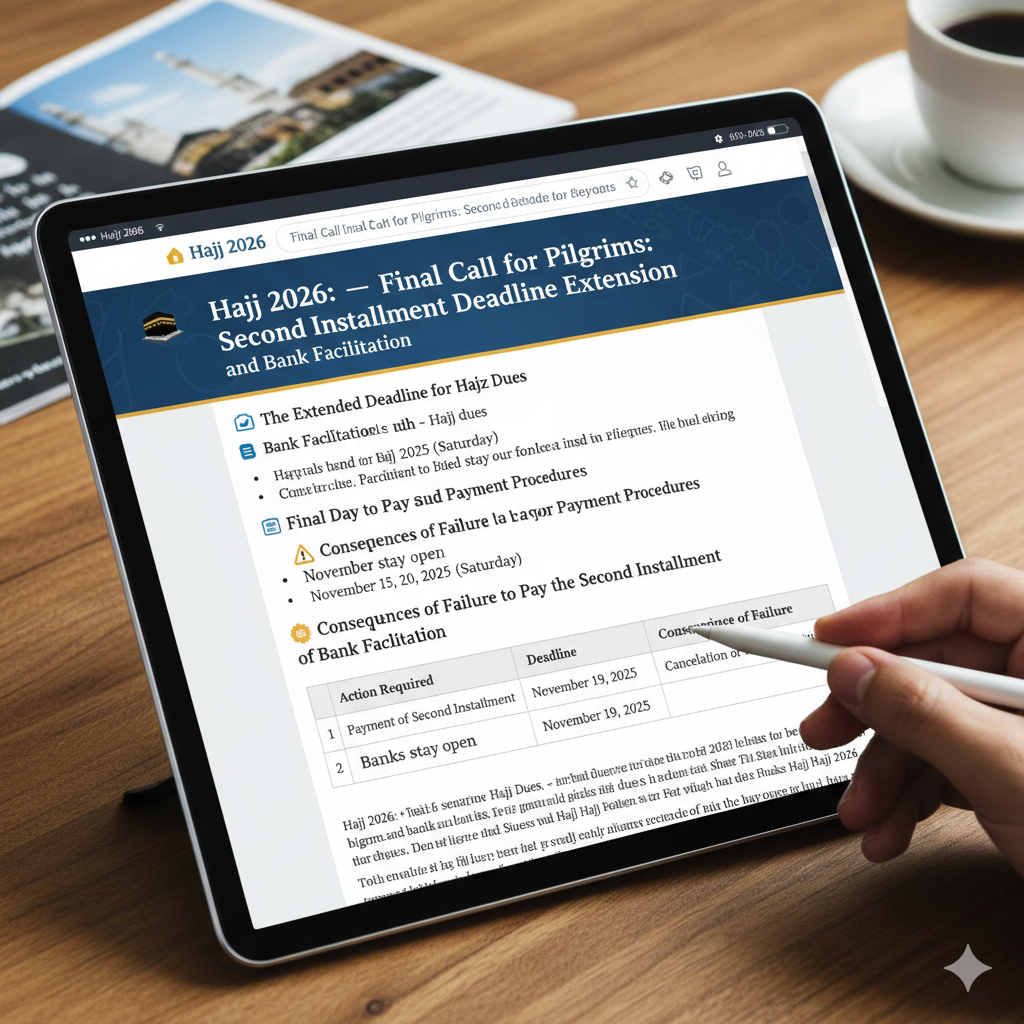 18-Nov-2025Hajj 2026 Second Installment Deadline Extension and Bank Facilitation
18-Nov-2025Hajj 2026 Second Installment Deadline Extension and Bank Facilitation -
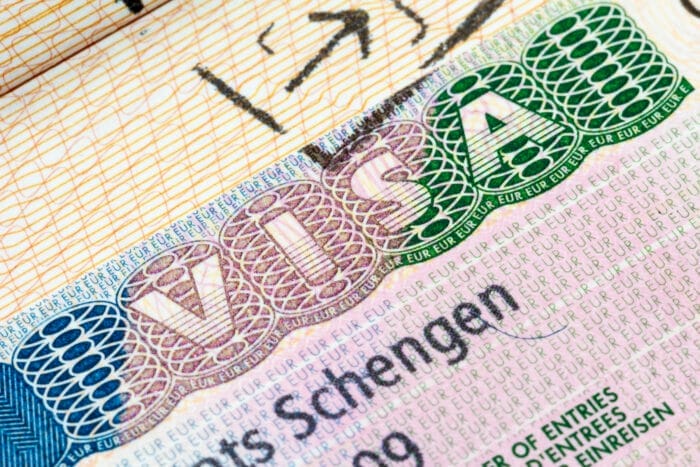 26-Aug-2025Schengen Visa Fees Breakdown: Why Some Countries Cost More and How to Calculate Your Total Cost
26-Aug-2025Schengen Visa Fees Breakdown: Why Some Countries Cost More and How to Calculate Your Total Cost -
 25-Nov-2025Best Time to Get the Lowest Umrah Ticket Price
25-Nov-2025Best Time to Get the Lowest Umrah Ticket Price -
 20-Oct-2025UAE Golden Visa Opens for Waqf Donors
20-Oct-2025UAE Golden Visa Opens for Waqf Donors -
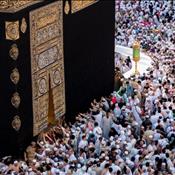 25-Apr-2022Umrah Last Date from Pakistan
25-Apr-2022Umrah Last Date from Pakistan -
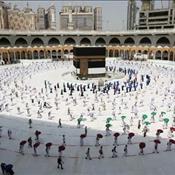 05-Aug-2020After Successful Completion Of Hajj Operation, Pilgrims Are Supposed To Perform Umrah With Precautions
05-Aug-2020After Successful Completion Of Hajj Operation, Pilgrims Are Supposed To Perform Umrah With Precautions -
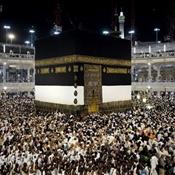 04-Mar-2023PIA Announces 2023 Hajj Pilgrimage Flight Fares
04-Mar-2023PIA Announces 2023 Hajj Pilgrimage Flight Fares -
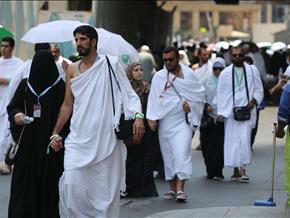 28-Jan-2025Top Travel Tips for a Smooth Umrah Experience in Ramadan 2025
28-Jan-2025Top Travel Tips for a Smooth Umrah Experience in Ramadan 2025 -
 23-Nov-2022Countries Offering E-visa Facilities For Pakistani Passports
23-Nov-2022Countries Offering E-visa Facilities For Pakistani Passports -
 23-Aug-2025Nusuk Umrah Platform: Simplifying Your Umrah Journey with Seamless Booking and Comprehensive Services
23-Aug-2025Nusuk Umrah Platform: Simplifying Your Umrah Journey with Seamless Booking and Comprehensive Services
